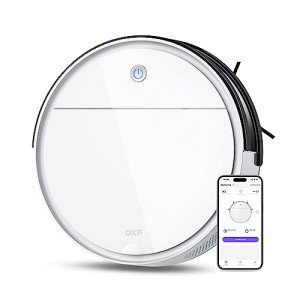It's Enough! 15 Things About Autonomous Vacuum We're Sick Of Hearing
The Rise of Autonomous Vacuums: Revolutionizing Home Cleaning
In the age of innovation, home chores are becoming significantly automated, and among the most noteworthy advancements in this realm is the autonomous vacuum. These intelligent cleaning robotics are created to alleviate the drudgery of conventional vacuuming, making them popular among time-strapped families. This short article checks out the development, performance, benefits, and restrictions of autonomous vacuums, together with a comparison of a few of the leading designs on the marketplace today.
What is an Autonomous Vacuum?
An autonomous vacuum, likewise known as a robotic vacuum cleaner, is a little, automated gadget that browses through your home to tidy floors without human intervention. Geared up with sensing units, electronic cameras, and advanced software, these vacuums can spot challenges, prevent stairs, and optimize cleaning courses. They typically operate from a rechargeable battery, going back to their charging stations when their power is low or when cleaning tasks are finished.
Secret Features of Autonomous Vacuums
Smart Navigation:
- Utilizes sensors and algorithms to map the environment.
- Can navigate complicated layouts and avoid challenges.
Scheduling:
- Allows users to set cleaning times.
- Can operate when your house is empty, guaranteeing minimal disturbance.
Connectivity:
- Many designs connect to Wi-Fi, enabling app control and combination with clever home systems.
- Users can tailor settings, check cleaning status, and get notifications through mobile applications.
Suction Power:
- Varies between models; some deal adjustable suction settings for different floor types.
- High-end designs include effective suction efficient in selecting up animal hair and deep dirt.
Floor Type Adaptability:
- Capable of cleaning carpets, hardwood, tiles, and more.
- Certain designs concentrate on tailored cleaning for multiple surfaces.
The Advantages of Using Autonomous Vacuums
1. Time-Saving
Among the most substantial advantages of autonomous vacuums is the quantity of time they save. Rather than investing hours pushing a conventional vacuum, homeowners can set robotic vacuums to clean while they are participated in other activities.
2. Consistent Cleaning Schedule
With the capability to schedule cleansings, these vacuums ensure that spaces are regularly cleaned, leading to a cleaner home in general. Routine cleaning helps keep indoor air quality, particularly for households with allergic reactions or asthma.
3. Smart Home Integration
Lots of autonomous vacuums can be incorporated with smart home systems for seamless operation. Property owners can control their vacuums by means of voice commands through devices like Amazon Alexa or Google Assistant, boosting user convenience.
4. Compact Design
The slim profile of these devices enables them to clean up under furniture, such as sofas and beds, where traditional vacuums frequently can not reach.
5. Pet-Friendly
For family pet owners, autonomous vacuums can be a game-changer, as they are frequently equipped with specialized functions for picking up family pet hair and dander, adding to a cleaner home environment.
Limitations of Autonomous Vacuums
Regardless of their many benefits, autonomous vacuums likewise have limitations:
1. Minimal Deep Cleaning
While these vacuums effectively maintain tidiness, they may not change the effectiveness of a deep tidy offered by traditional vacuums, especially for heavily soiled areas.
2. Capacity Constraints
A lot of autonomous vacuums included small dust bins that require to be emptied often, particularly in larger homes or homes with family pets. This can be an inconvenience for some users.
3. Navigation Challenges
Although navigation technology is constantly improving, some models may have a hard time with particular layouts, especially complex areas with various barriers or really little rooms.
4. Cost Point
While prices have ended up being more available, high-end models can still be quite costly, posing a barrier for some consumers.
Comparison of Top Autonomous Vacuum Models
Model
Smart Features
Battery Life
Suction Strength
Price Range
iRobot Roomba 980
App Control, Voice Assistant
120 minutes
1700 Pa
₤ 700 – ₤ 900
Roborock S6 MaxV
Advanced Mapping, Connectable
180 minutes
2500 Pa
₤ 600 – ₤ 800
Ecovacs Deebot Ozmo
Mopping, Smart Home
110 minutes
1500 Pa
₤ 450 – ₤ 700
Neato Botvac D7
Laser Navigation, Custom Zones
120 minutes
2000 Pa
₤ 800 – ₤ 900
Shark IQ Robot
Self-Emptying Base, Smart Map
90 minutes
1500 Pa
₤ 400 – ₤ 600
Significant Takeaways
- Smart Features: Consumers ought to focus on models providing robust wise features for benefit and performance.
- Battery Life: A longer battery life is helpful for larger living areas.
- Suction Strength: Depending on family needs, varying suction power can considerably affect cleaning effectiveness.
FAQs about Autonomous Vacuums
Q1: How do I preserve my autonomous vacuum?
A: Regular maintenance includes cleaning the brushes, emptying the dustbin, and examining for obstructions. Furthermore, keeping the sensing units clean will assist keep navigation accuracy.
Q2: Can robotic vacuums clean carpets and carpets?
A: Yes, many robotic vacuums are designed to successfully clean both tough surfaces and carpets. Nevertheless, suction power may differ based on the model.
Q3: Do robotic vacuums require Wi-Fi?
A: While lots of autonomous vacuums take advantage of Wi-Fi connection for app control and updates, some models can operate separately without a cordless connection.
Q4: How typically should I run my robotic vacuum?
A: It depends upon your living circumstance, but running it several times a week is typically advised, especially for homes with pets.
In conclusion, autonomous vacuums represent a significant improvement in home cleaning innovation, promising convenience and performance. While auto vacuum cleaner might not completely change conventional vacuum, they are certainly practical in preserving a tidy living environment. As innovation continues to progress, the future of home cleaning looks appealing, and these devices are at the forefront of the transformation.
